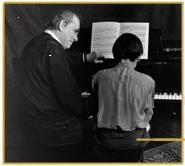This entry represents the last edition of our Talent Code series (1, 2, 3, 4), which has spanned most of this last week. Again, I am reporting primarily what Dan Coyle has found in his extensive research regarding talent development.
 The focus of this final edition is on Coaches, or as Coyle puts it: Master Coaching. These are teachers, coaches, managers and mentors who approach the task of nurturing and helping others to grow “talent” (or in Coyle’s belief- build myelin: the essential ingredient to brain growth). Coyle begins by pointing out that coaching/teaching/mentoring/managing is a skill, in itself, that takes a long time to build, and eventually master.
The focus of this final edition is on Coaches, or as Coyle puts it: Master Coaching. These are teachers, coaches, managers and mentors who approach the task of nurturing and helping others to grow “talent” (or in Coyle’s belief- build myelin: the essential ingredient to brain growth). Coyle begins by pointing out that coaching/teaching/mentoring/managing is a skill, in itself, that takes a long time to build, and eventually master.
To support his claim, Coyle presents some fantastic examples of coaches, music teachers, and school teachers who have put in many thousands of hours of deep practice coaching and mentoring. In other words… If you want to be a great coach, you need to hone your skills! If you are an owner of a company, you must insist that your managers work on their coaching, just as they would any other skill they want to develop.
Coyle calls these great coaches “The Talent Whisperers.” They are the teachers who view their jobs with the utmost seriousness. These are the individuals who understand that it’s up to them to tap and sustain the second element of The Talent Code…Ignition. As Coyle puts it, “They are creating and sustaining motivation.”
Dr. Bloom, from the University of Chicago, researched 120 world class talents and summarizes:
“The effect of the first phase of learning seems to be to get the learner involved, captivated, hooked, and to get the learner to need and want more information.”
If you are responsible for managing/teaching/coaching, do you accomplish this? I know that I have fallen short at times…or perhaps more importantly, lost sight of this underlying purpose of teaching. If I’ve been a successful teacher by presenting you this fascinating insight from the The Talent Code, you might take it further, and read more from Dan Coyle’s book, which is full of similar insight. And then apply, apply, apply…

